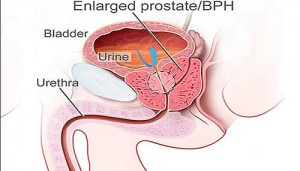
Prostate cancer is a cancer that forms in the tissues of the prostate gland, which is found only in male reproductive system. Most prostate cancers are slow growing; however, there are still cases of prostate cancers growing aggressively. Globally it is the sixth leading cause of cancer-related death in men despite to the fact that it can often be treated successfully. In Singapore, more and more cases of prostate cancers are detected each year. Prostate cancer occurs mostly in older men.
In the early stage of prostate cancer, there is usually no manifestation of symptoms. Sometimes, however, there are symptoms that often confused with the disease such as benign prostatic hyperplasia. These symptoms include slow dribbling urinary flow, frequent urination during night or nocturia, painful urination or dysuria, and blood in the urine or hematuria. Prostate cancer is associated with the problem of the urinary functions because of its anatomical position. Prostate gland surrounds the urethra that caries the urine from the bladder during urination.
Prostate cancer may also cause problems during sexual intercourse such as pain and erectile dysfunction. Other symptoms can potentially develop during later stages of the disease when the cancer cells have metastasized to other parts of the body such as the bones and lymph nodes.
Prostate cancer is usually screened by palpating the prostate in digital rectal exam wherein the patient is placed in a position where the anus is accessible. The doctor then will insert fingers to palpate the prostate if it is hard or nodular. Another way of screening is the blood test called Prostate Specific Antigen that is being produced by the prostate cells.
Abnormal PSA or nodule in the prostate does not imply prostate cancer. A prostate biopsy is needed to confirm the diagnosis, if cancer is suspected. Prostate biopsy involves obtaining of tissue samples from the prostate via the rectum under ultrasound guidance. The tissue is then sent to the pathologist, a specialist who reviews tissues, for confirmation. This procedure is usually being performed in the clinic on an out-patient basis and rarely requires hospitalization.
There is an on-going debate as to the merits of screening for prostate cancer. It is best to discuss this with the attending physician about the pros and cons of these screenings before deciding the right choice for you.
Treatment for prostate cancer depends on its stage, age, and general health condition. There are cases that treatment is not in need such as those with serious health problem especially for elderly with low-grade form of cancer which often grows slowly. And those who are expected to live long enough before the manifestation of symptoms.
There are ways to treat prostate cancer. A combination of the treatment options is often recommended for managing prostate cancer. All treatments can have significant side effects such as erectile dysfunction and urinary incontinence. It is best to discuss the options with the attending physician to balance the goals of the treatment course with the risks of alteration in lifestyle.